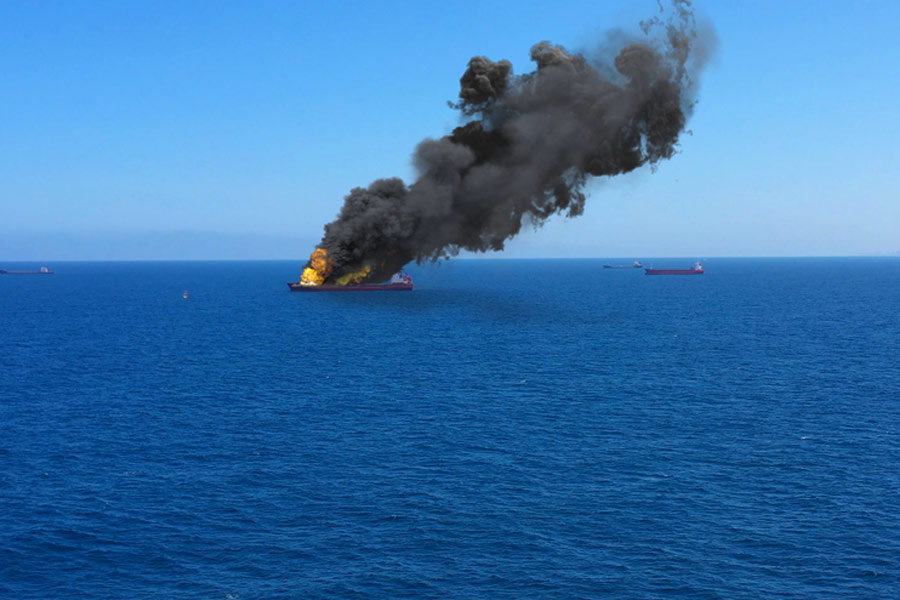The Indian Navy has rushed to the aid of the British petroleum tanker, the Marlin Luanda, which sent out a Mayday call after it was hit by a Houthi missile overnight in the Gulf of Aden and burst into flames.
The Marlin Luanda, which is carrying a Russian-produced refined oil product, has a crew of 22 Indian sailors and one Bangladeshi and the INS Visakhapatnam, which has been deployed in the Gulf of Aden, is aiding with their firefighting efforts.
The 250m-long Marlin Luanda caught fire after it was hit by the anti-ballistic missile late last night fired from a Houthi-controlled part of Yemen and the crew has been struggling to put out the flames since then. No injuries have been reported among the crew.
An Indian Navy spokesperson said: “The firefighting efforts onboard the distressed merchant vessel is being augmented by the team along with firefighting equipment deployed by the INS Visakhapatnam.” The blaze is the biggest to be caused by the more than 30 attacks by the Iran-backed Houthis in the three months that they have been attacking commercial vessels in the Red Sea area.
The Marlin Luanda is carrying its Russian naphtha cargo to Singapore. The attack came as a surprise because there is said to be a tacit understanding, brokered by the Iranians, that the Houthis would not attack Russian ships and cargoes.Iran considers Moscow an ally.
However in this case, the Marlin Luanda is sailing under the flag of the Marshall Islands and is operating on behalf of Singapopre-based trading giant Trafigura while its registered owner is London-based Oceonix Services. In claiming responsibilities for the attack, the Houthis described the vessel as a “British oil ship.” The UK and the US have been mounting strikes against the Houthis in an effort to protect commercial shipping travelling to and from the vital Suez Canal.
Russian and Saudi ships have continued to use the Suez Canal, almost certainly because they have an unwritten agreement that their ships would not be attacked by the Houthis. The Houthis say they are targeting commercial vessels travelling through the Red Sea, one of the world’s busiest shipping lanes, to support Palestinians in Gaza, where Israel is fighting Hamas.
“Oil tankers still are transiting the Red Sea, especially those carrying Russian-origin cargoes. Until now the Russians were the only suppliers that had effectively kept their Suez Canal/Red Sea transit unchanged. Now this might alter their strategies,” says Viktor Katona, lead crude analyst, at Kpler, a global trade intelligence firm.
If the Russians stop using the Suez Canal, it could push up the cost of Russian crude oil that is being bought in large quantities by Indian companies like IndianOil and Reliance. About 50-55 ships carrying Russian crude come through the Suez Canal each month. Besides that, Russian ships carrying coal and sunflower oil to India, also transit the Suez.
Many commercial vessels are taking a much longer journey around Africa’s Cape of Good Hope to avoid being attacked.
Another ship carrying Russian Urals grade crude to India had a near miss last night when a Houthi missile exploded not far away from it.
The INS Vishakapatnam earlier aided the MV Genco Picardy which was hit by a drone on January 18, The Genco Picardy’s 22-strong crew included nine Indians. However, the damage to the Genco Picardy was fairly minor.










